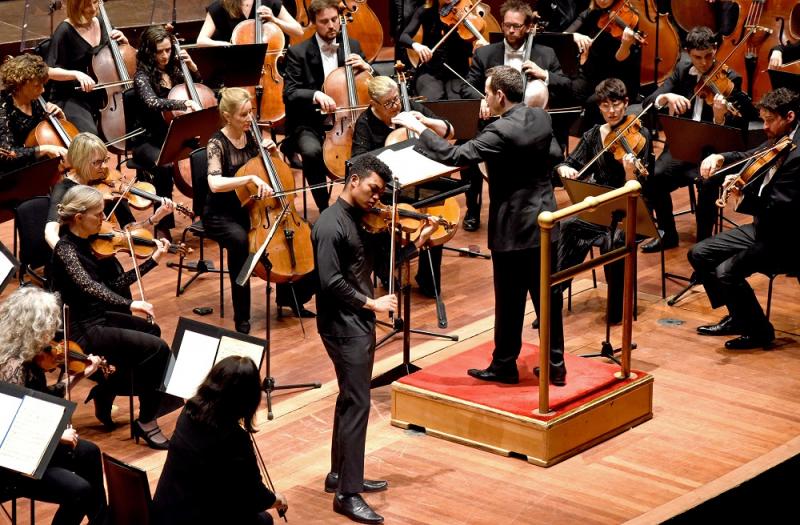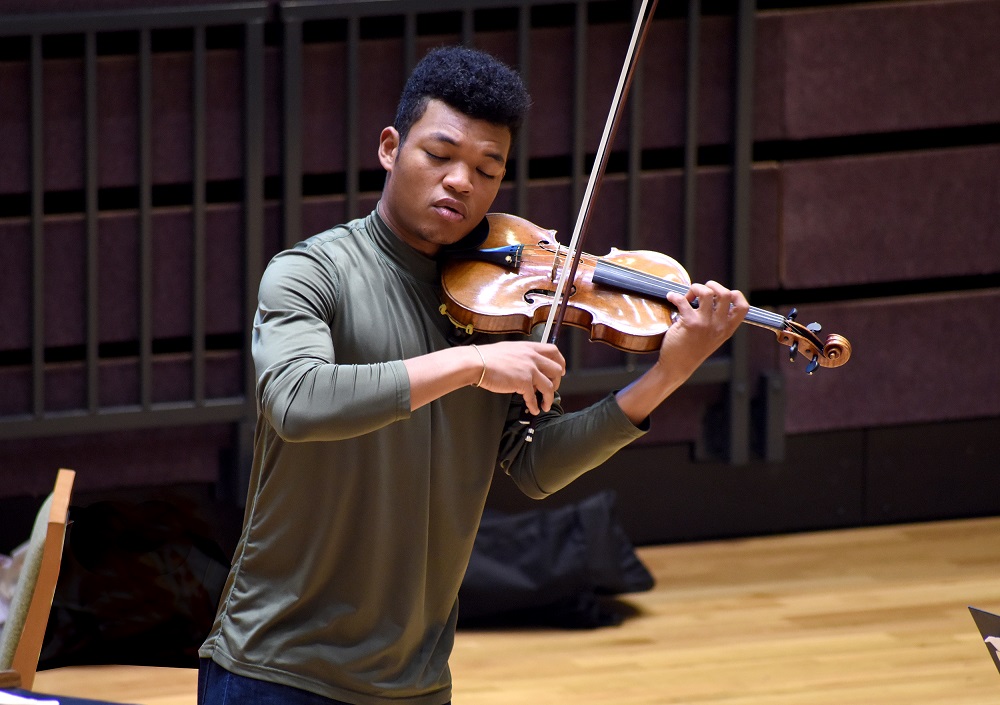Goosby, RSNO, Bringuier, Usher Hall, Edinburgh review - lyrical colour and dynamic brilliance | reviews, news & interviews
Goosby, RSNO, Bringuier, Usher Hall, Edinburgh review - lyrical colour and dynamic brilliance
Goosby, RSNO, Bringuier, Usher Hall, Edinburgh review - lyrical colour and dynamic brilliance
A dazzling young violinist and a first-rate stand-in conductor offer terrific Tchaikovsky

When a publication as venerable as Gramophone features an artist on its front cover, it’s a surefire sign that they’ve hit the big time. This month that honour fell to young American violinist Randall Goosby and, coincidentally, he was the soloist for this week’s concerts with the Royal Scottish National Orchestra. I hadn’t come across him before this double encounter but, if his Usher Hall performance is anything to go by, then the hype around him is justified.
The beauty, poetry and sheer confidence of his performance of Tchaikovsky’s Violin Concerto was a marvellous thing to witness. Partly it was in the way Goosby stood: rock-solid throughout, scarcely moving, and never giving any flashy touches of pizzazz though, in a nice touch, during his periods of silence he would often turn towards the orchestra rather than the audience, as though to acknowledge them and to hail their contribution.
Goosby’s way with the music was really special, his violin tone silvery at the top with rich warmth in the lower register, and the calm determination with which he approached the score freed him to inject lyrical colour and dynamic brilliance into his phrasing. The first movement’s main theme was rich and smooth, while the second movement was more operatic aria than canzonetta, rich with feeling and ripe with a gorgeous sense of longing. The Russian dance of the finale was full of heel-kicking energy, where even Goosby’s passagework sounded clear and characterful. (PIctured below: Goosby in rehearsal).  Conductor Lionel Bringuier, who had stood in at very short notice, held soloist and orchestra in a lovely balance, and the orchestral sound felt gloriously buoyed along in the big tutti sections. Among many noteworthy details, the flute line floated in beautifully after the first movement cadenza, and the cellos had a terrific time during their hurdy-gurdy moments in the finale.
Conductor Lionel Bringuier, who had stood in at very short notice, held soloist and orchestra in a lovely balance, and the orchestral sound felt gloriously buoyed along in the big tutti sections. Among many noteworthy details, the flute line floated in beautifully after the first movement cadenza, and the cellos had a terrific time during their hurdy-gurdy moments in the finale.
Orchestra and conductor were even finer, however, in a top-notch performance of Tchaikovsky’s Sixth (“Pathétique”) Symphony, finely shaded and precisely sculpted. The opening alone seemed to contain fifty shades of dark, each one very distinctive, with piercing winds and shadowy strings. The great major-key theme, when it finally appeared on the strings, was suffused with longing and surging with passion before being subsumed into a cauldron of passion in the central development. Hard-edged timps lent extra drama to a thundering climax, out of which crawled a love theme that seemed to cling on in defiance despite all its adversity; a marvellous moment. The waltz was assertive and deliberate, while Bringuier’s tempo for the march, slightly slower than usual, gave it an extra edge of precision, leading into a finale that rose to heights of passion before sinking into depths of despair and a long-held silence before the audience dared to clap. Conductors who step in at short notice are always heroes, but there was definite chemistry here, alongside palpable drama. I hope it’s a relationship the RSNO can cultivate again.
As a curtain-raiser, David Monrad Johansen’s Pan couldn’t hold its own in such great musical company. It’s tonal, descriptive, and pleasant to listen to, but also pretty circular and seems to spend its time waiting for a climax that never quite arrives. An interesting novelty, but ultimately rather bland, and I doubt I’ll be seeing Johansen’s name on many more concert programmes.
rating
Explore topics
Share this article
The future of Arts Journalism
You can stop theartsdesk.com closing!
We urgently need financing to survive. Our fundraising drive has thus far raised £49,000 but we need to reach £100,000 or we will be forced to close. Please contribute here: https://gofund.me/c3f6033d
And if you can forward this information to anyone who might assist, we’d be grateful.

Subscribe to theartsdesk.com
Thank you for continuing to read our work on theartsdesk.com. For unlimited access to every article in its entirety, including our archive of more than 15,000 pieces, we're asking for £5 per month or £40 per year. We feel it's a very good deal, and hope you do too.
To take a subscription now simply click here.
And if you're looking for that extra gift for a friend or family member, why not treat them to a theartsdesk.com gift subscription?
more Classical music
 Kohout, Spence, Braun, Manchester Camerata, Huth, RNCM, Manchester review - joy, insight, imagination and unanimity
Celebration of the past with stars of the future at the Royal Northern College
Kohout, Spence, Braun, Manchester Camerata, Huth, RNCM, Manchester review - joy, insight, imagination and unanimity
Celebration of the past with stars of the future at the Royal Northern College
 Jansen, LSO, Pappano, Barbican review - profound and bracing emotional workouts
Great soloist, conductor and orchestra take Britten and Shostakovich to the edge
Jansen, LSO, Pappano, Barbican review - profound and bracing emotional workouts
Great soloist, conductor and orchestra take Britten and Shostakovich to the edge
 Jakub Hrůša and Friends in Concert, Royal Opera review - fleshcreep in two uneven halves
Bartók kept short, and a sprawling Dvořák choral ballad done as well as it could be
Jakub Hrůša and Friends in Concert, Royal Opera review - fleshcreep in two uneven halves
Bartók kept short, and a sprawling Dvořák choral ballad done as well as it could be
 Hadelich, BBC Philharmonic, Storgårds, Bridgewater Hall, Manchester review - youth, fate and pain
Prokofiev in the hands of a fine violinist has surely never sounded better
Hadelich, BBC Philharmonic, Storgårds, Bridgewater Hall, Manchester review - youth, fate and pain
Prokofiev in the hands of a fine violinist has surely never sounded better
 Monteverdi Choir, ORR, Heras-Casado, St Martin-in-the-Fields review - flames of joy and sorrow
First-rate soloists, choir and orchestra unite in a blazing Mozart Requiem
Monteverdi Choir, ORR, Heras-Casado, St Martin-in-the-Fields review - flames of joy and sorrow
First-rate soloists, choir and orchestra unite in a blazing Mozart Requiem
 Cho, LSO, Pappano, Barbican review - finely-focused stormy weather
Chameleonic Seong-Jin Cho is a match for the fine-tuning of the LSO’s Chief Conductor
Cho, LSO, Pappano, Barbican review - finely-focused stormy weather
Chameleonic Seong-Jin Cho is a match for the fine-tuning of the LSO’s Chief Conductor
 Classical CDs: Shrouds, silhouettes and superstition
Cello concertos, choral collections and a stunning tribute to a contemporary giant
Classical CDs: Shrouds, silhouettes and superstition
Cello concertos, choral collections and a stunning tribute to a contemporary giant
 Appl, Levickis, Wigmore Hall review - fun to the fore in cabaret and show songs
A relaxed evening of light-hearted fare, with the accordion offering unusual colours
Appl, Levickis, Wigmore Hall review - fun to the fore in cabaret and show songs
A relaxed evening of light-hearted fare, with the accordion offering unusual colours
 Lammermuir Festival 2025, Part 2 review - from the soaringly sublime to the zoologically ridiculous
Bigger than ever, and the quality remains astonishingly high
Lammermuir Festival 2025, Part 2 review - from the soaringly sublime to the zoologically ridiculous
Bigger than ever, and the quality remains astonishingly high
 BBC Proms: Ehnes, Sinfonia of London, Wilson review - aspects of love
Sensuous Ravel, and bittersweet Bernstein, on an amorous evening
BBC Proms: Ehnes, Sinfonia of London, Wilson review - aspects of love
Sensuous Ravel, and bittersweet Bernstein, on an amorous evening
 Presteigne Festival 2025 review - new music is centre stage in the Welsh Marches
Music by 30 living composers, with Eleanor Alberga topping the bill
Presteigne Festival 2025 review - new music is centre stage in the Welsh Marches
Music by 30 living composers, with Eleanor Alberga topping the bill
 Lammermuir Festival 2025 review - music with soul from the heart of East Lothian
Baroque splendour, and chamber-ensemble drama, amid history-haunted lands
Lammermuir Festival 2025 review - music with soul from the heart of East Lothian
Baroque splendour, and chamber-ensemble drama, amid history-haunted lands

Add comment